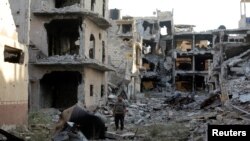Two months after the dominant military force in eastern Libya declared victory in a campaign to retake Benghazi, Hassan al-Zawy is living rough in his home in the district that witnessed the city's last major battle.
Like many other residents, he ventured back as Khalifa Haftar's Libyan National Army gradually wrested back control from Islamist militants and other rebel groups.
Parts of Libya's second city were reduced to rubble during more than three years of fighting and, with economic crisis and political turmoil gripping the country, rebuilding is a daunting challenge.
"There are flies, mosquitoes and garbage. At night, we have absolutely nothing," Zawy told Reuters in mid-August in the seafront neighborhood of Sabri.
"We've been here for one month and 10 days and all we want from the state is [this]: electricity and water, and for people to return to their homes, and stay there."
A conflict that developed after strongman Moamar Gadhafi was toppled in an uprising six years ago has yet to be resolved. Benghazi, where the 2011 revolution started, has seen some of the worst violence. Tens of thousands of residents, many opposed to Haftar, were displaced to other Libyan cities.
Sabri is where Haftar's rivals had their final strongholds, and was bombarded by LNA heavy artillery and airstrikes up until a few weeks ago. Sporadic fighting continued after Haftar announced victory on July 5.
People recover what they can from the rubble of ruined buildings. Children help with the cleanup.
Afterwards, men sit outside drinking tea or coffee and guarding their streets. One says he will stay in his home even if he has to hang towels over the doors and windows.
Another Sabri resident, Farag Mahmoud, said some people were so keen to get back to their homes that they were ignoring the risk from land mines still planted in parts of the district.
"We found our homes had been flooded from broken pipes in the plumbing systems, and were submerged in water around 70 to 80 centimeters deep," he said.
Some returning residents have formed citizens' committees to lobby the municipal authorities on water, electricity and hygiene, said Milad Fadlallah, a local engineer.
Most residents in the less severely damaged eastern part of Sabri would be able to spend the Muslim holiday of Eid al-Adha, which starts on Sept. 1, back in their neighborhood, Fadlallah said.
But a lack of funds and political leadership in a country still divided between two rival governments will hinder reconstruction, said Osama al-Kaza, director of projects at Benghazi's municipality.
In Benghazi, the conflict has also had left deep physical and psychological scars.
"Achieving an outstanding and modern image for the city will have to be done in stages, will take years and cost billions," he said.








